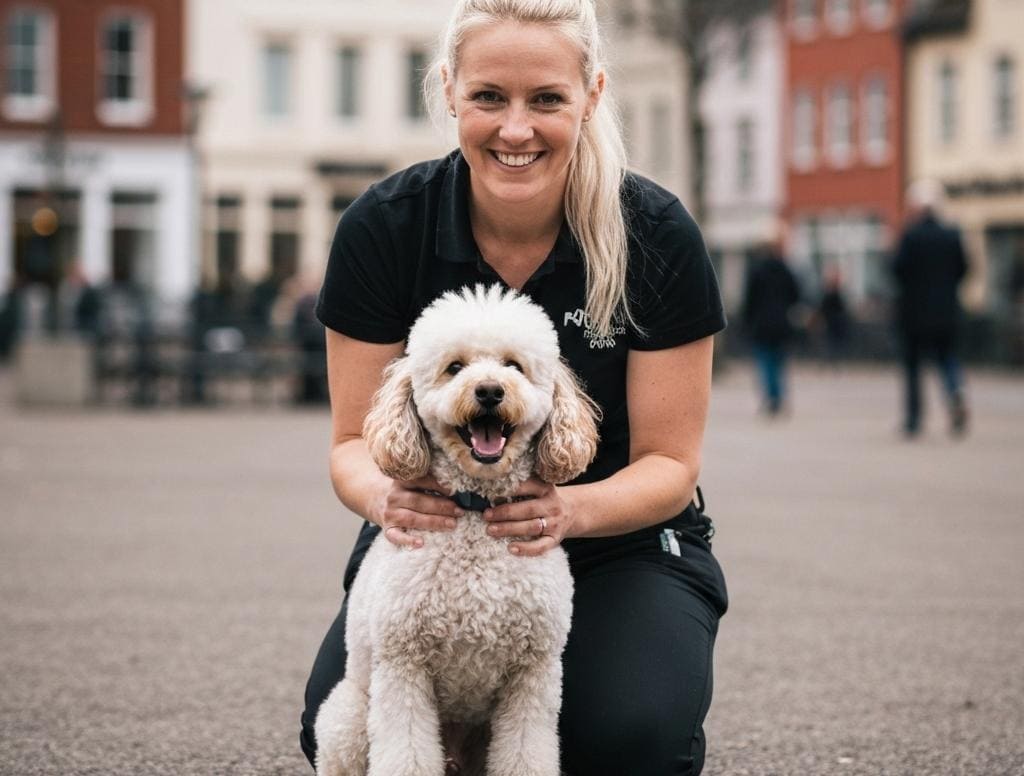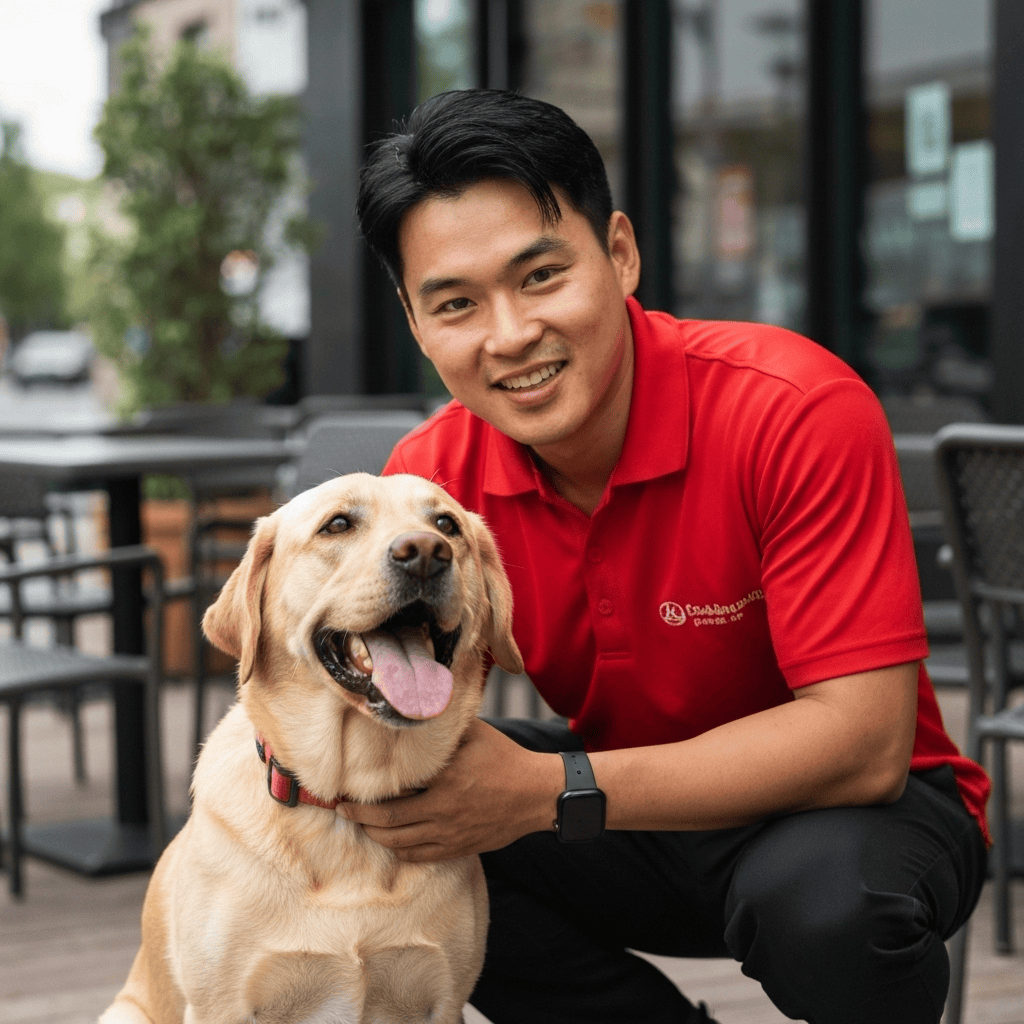Your Complete Guide to Choosing a Dog Trainer in West Chester
Living in West Chester means your dog encounters busy sidewalks, college students, and constant activity around the Borough and West Chester University. The right training program prepares your dog for real life here, not just perfect behavior in a quiet room.
When you’re walking downtown or through campus areas, you want a dog who can handle distractions with calm confidence. That kind of reliability comes from working with a trainer who understands both effective methods and our local environment.
Finding the Right Trainer for Your Dog
The best trainers in our area use positive reinforcement methods and know how to apply them in real West Chester settings. Your dog should learn to walk calmly past the university crowds, greet people politely at Everhart Park, and stay focused even when cyclists zip by on the Chester Valley Trail.
Professional credentials tell you a lot about a trainer’s knowledge and commitment to ongoing education. Look for respected certifications like KPA-CTP, CPDT-KA, or IAABC-CDBC for behavior challenges. These programs require extensive study and testing, so certified trainers typically have deeper knowledge of learning theory and behavior modification.
Think about what format works best for your household and goals. In-home training lets you work on real-life issues like door manners and barking at delivery trucks. Group classes provide controlled socialization and distraction training. Private lessons move faster if you have specific goals or scheduling constraints.
The key question to ask any trainer is how they’ll help your dog succeed in actual West Chester situations. Good programs start with foundation skills at home, then gradually add the sights, sounds, and chaos your dog encounters in daily life.
Understanding Different Training Approaches

Positive reinforcement builds behaviors by rewarding what you want to see more often. Dogs learn faster and retain skills longer when training feels good, and you build a stronger relationship based on trust rather than fear.
When dogs have behavior problems like reactivity, anxiety, or aggression, skilled trainers use behavior modification techniques like desensitization and counterconditioning. These methods gradually change how your dog feels about triggers, creating lasting improvement without stress or force.
Puppy programs focus on critical early learning – socialization, house training, bite inhibition, and basic manners. Young dogs need short, positive sessions and lots of exposure to West Chester’s unique environment during their key learning window.
You might hear trainers mention dominance theory or pack leadership, but modern animal behavior science has moved beyond these outdated concepts. Professional trainers understand that dogs aren’t trying to dominate their families – they’re just doing what works to get their needs met.
If a trainer suggests harsh corrections, shock collars, or methods that cause fear or pain, keep looking. Effective training doesn’t require intimidation, and stress actually makes learning harder for dogs.
Training Costs in West Chester and Chester County
Training prices vary based on the trainer’s experience, session length, and program complexity. Here’s what local dog owners typically pay in 2025:
| Service Type | Typical Price Range |
|---|---|
| Group classes (5–7 weeks) | $180 – $320 total |
| Puppy classes | $180 – $300 total |
| Private lessons (60–75 minutes) | $110 – $170 per session |
| Initial behavior consult | $150 – $250 first session |
| Day training (trainer works your dog + owner handoff) | $500 – $950 per week |
| Board and train (2–4 weeks) | $2,200 – $4,800 total |
| Virtual coaching (45–60 minutes) | $80 – $140 per session |
Many trainers offer package deals that reduce the per-session cost. Behavior modification for issues like separation anxiety or aggression typically costs more because it requires specialized knowledge and longer timelines.
Always ask what’s included in the price – some trainers charge extra for travel, training materials, or follow-up support. Understanding the total investment upfront helps you budget appropriately.
Local Laws and Requirements You Should Know
West Chester Borough requires dogs to be leashed in public spaces and owners to clean up after their pets. This means your recall training happens in fenced areas, and loose-leash walking becomes especially important for daily life.
Pennsylvania requires all dogs three months and older to have current licenses and rabies vaccinations. You handle licensing through Chester County – get details and renew online at Chester County Dog Licenses.
For rabies requirements and bite reporting procedures, the PA Department of Health provides guidance at PA Department of Health Rabies. Chester County’s specific rabies control information is available at Chester County Rabies Control.
If your trainer wants to use public parks for classes, they may need permits and insurance. Contact West Chester Parks & Recreation for requirements at West Chester Parks & Recreation.
What to Ask When Interviewing Trainers
The right questions help you find someone who matches your needs and uses methods you’re comfortable with:
- What training philosophy and methods do you use?
- What certifications or credentials do you hold?
- How do you customize programs for different dogs and goals?
- Can you work with my dog in real West Chester environments?
- What’s included in your packages, and are there additional fees?
- Do you carry liability insurance?
- How do you handle behavior problems versus basic obedience?
- What role will I play in the training process?
- How do you measure progress and decide when to advance?
- Can you provide references from recent clients?
Pay attention to how trainers answer these questions. Good professionals explain their methods clearly, discuss your specific situation, and never promise unrealistic timelines or results.
Local Resources for Dog Owners
West Chester and the surrounding area offer several great spots for training practice and dog recreation:
Robert E. Lambert Park Dog Park in West Goshen Township provides a fenced area for off-leash socialization and recall practice. It’s membership-based, so check current requirements through West Goshen Parks & Recreation.
Stroud Preserve offers beautiful trails where leashed dogs can practice walking skills around wildlife and other hikers. Find trail maps and rules at Stroud Preserve.
The Chester Valley Trail provides a paved, multi-use path perfect for practicing loose-leash walking around cyclists and joggers. Access information is available through Chester Valley Trail.
For licensing questions and lost dog resources, the Chester County Treasurer’s office maintains helpful information at Chester County Dog Licenses.
Building Training Into Daily Life
The best training happens throughout your regular routine, not just during formal sessions. Morning walks become opportunities to practice loose-leash skills. Doorbell rings turn into greeting practice. Even feeding time can reinforce patience and impulse control.
Start building good habits in quiet settings, then gradually add the distractions your dog will face in real life. A dog who sits reliably in your living room isn’t necessarily ready to sit calmly while students walk by on campus.
This gradual approach, called proofing, helps your dog generalize skills to different situations. Work with your trainer to create practice scenarios that mirror your actual daily routine and environment.

Common Questions About Dog Training
How much does dog training cost in West Chester?
Most private lessons run $110-$170 per session, while group classes cost $180-$320 for a complete program. Behavior modification and board-and-train programs cost more due to their specialized nature and time requirements.
Is in-home training better than group classes?
Both have advantages. In-home training addresses problems where they actually happen and fits your specific household needs. Group classes provide controlled socialization and distraction training that’s hard to replicate at home.
How long does dog training take?
Basic manners typically improve within 4-8 weeks with consistent practice. Behavior issues like reactivity or separation anxiety often require several months of structured work with professional guidance.
What should I look for in a dog trainer?
Look for positive reinforcement methods, professional credentials, insurance coverage, and experience with your specific goals. Good trainers explain their methods clearly and involve you actively in the training process.
Can older dogs learn new behaviors?
Absolutely. While puppies learn faster, adult and senior dogs can master new skills with appropriate methods and patience. Age might slow the process slightly, but it doesn’t prevent successful training.
What’s the difference between training and behavior modification?
Training typically focuses on teaching new skills like sit, stay, and loose-leash walking. Behavior modification addresses problem behaviors by changing emotional responses to triggers – it’s more complex and usually requires specialized knowledge.
Do I need to keep training after my dog learns basic skills?
Skills fade without practice, especially in new situations. Most dogs benefit from occasional refresher sessions and ongoing practice to maintain reliability in different environments.
What if my dog doesn’t respond to positive reinforcement?
When positive reinforcement seems ineffective, the issue is usually timing, motivation, or environmental factors rather than the method itself. A skilled trainer can troubleshoot what’s not working and adjust the approach accordingly.
Should I train my dog myself or hire a professional?
Simple skills like basic commands can often be learned through books or online resources. Complex issues, behavior problems, or when you’re not seeing progress after several weeks typically benefit from professional guidance.
What age should I start training my puppy?
Start immediately after bringing your puppy home, usually around 8-12 weeks old. Early socialization and foundation skills during the critical learning period (before 16 weeks) create lifelong benefits for behavior and confidence.
